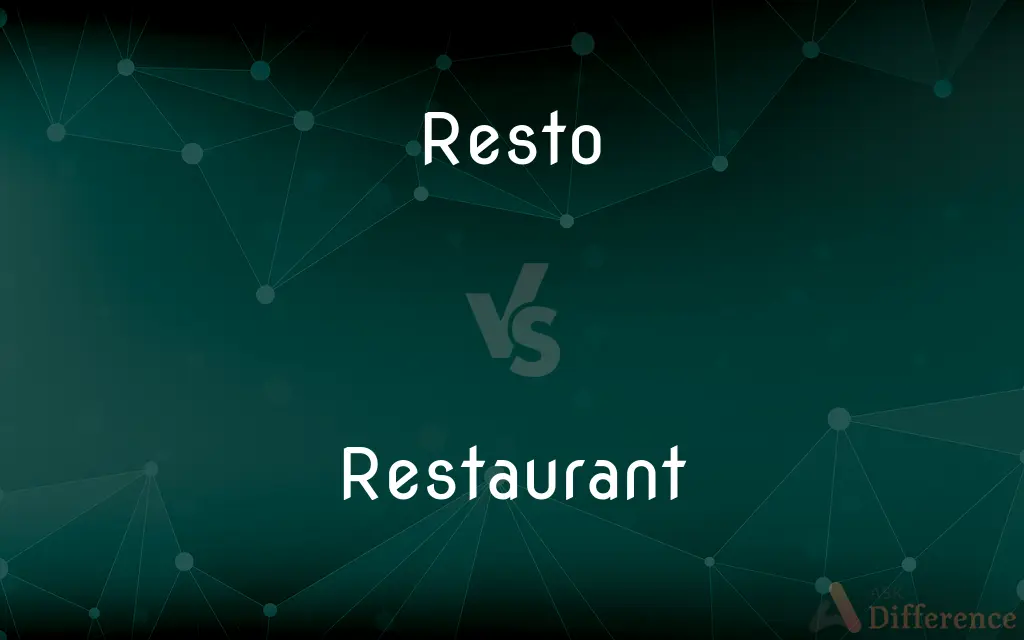Resto vs. Restaurant — What's the Difference?
By Fiza Rafique & Urooj Arif — Updated on March 31, 2024
"Resto" is a casual, shortened form of "restaurant," used informally to refer to dining establishments, while "restaurant" is the full, formal term.

Difference Between Resto and Restaurant
Table of Contents
ADVERTISEMENT
Key Differences
"Resto" is an informal, colloquial term often used in casual conversation or in trendy branding to refer to a restaurant. It suggests a laid-back, possibly modern dining experience. On the other hand, "restaurant" is the complete term that denotes any establishment serving meals and drinks to customers, encompassing a wide range of types from fast food to fine dining.
While "resto" might be used more frequently in certain dialects or among younger generations, "restaurant" is universally understood and used across English-speaking regions. The term "restaurant" carries a formality and specificity that "resto" eschews, making "restaurant" more appropriate in formal writing or when detailed clarity is necessary.
The use of "resto" can convey a sense of familiarity or informality about the dining experience, perhaps suggesting a more personal or intimate setting. In contrast, "restaurant" is a neutral term that does not inherently convey any information about the style, atmosphere, or quality of the establishment.
In marketing and branding, "resto" might be chosen to appeal to a specific audience or to convey a brand identity that is youthful, trendy, or casual. Meanwhile, "restaurant" is more likely to be used when an establishment wishes to emphasize tradition, elegance, or a broad appeal.
The preference for "resto" versus "restaurant" can also reflect cultural nuances and language influences. For instance, "resto" is commonly used in French-speaking regions and countries, and its usage in English may carry a hint of cosmopolitan or multicultural flair. In contrast, "restaurant" is a widely recognized term with clear origins in French, adopted into English in the 19th century, denoting a place where food is prepared and served to customers.
ADVERTISEMENT
Comparison Chart
Formality
Informal, casual
Formal, standard
Usage
Casual conversations, trendy branding
Universal, across all contexts
Connotation
Suggests a laid-back or modern atmosphere
Neutral, does not imply specific qualities
Audience
Younger generations, specific cultural contexts
Broad audience, universal
Marketing
Used to convey trendiness or casualness
Emphasizes tradition, elegance, or broad appeal
Compare with Definitions
Resto
A casual term for a restaurant.
Let's grab some burgers at that new resto downtown.
Restaurant
An establishment where meals and drinks are served to customers.
The restaurant received a five-star review for its cuisine.
Resto
May suggest a smaller, possibly more intimate dining setting.
Our favorite resto only seats twenty people, so let's book ahead.
Restaurant
Can range from fast food to fine dining.
That restaurant is known for its exquisite seafood dishes.
Resto
Often used to denote a trendy or informal eatery.
The corner resto serves the best tacos in town.
Restaurant
The term encompasses a broad spectrum of dining experiences.
We're looking for a restaurant that can accommodate a large group.
Resto
Used in youthful or trendy contexts.
This app lists all the coolest restos in the city.
Restaurant
Used universally in both casual and formal contexts.
The guidebook recommends several family-friendly restaurants.
Resto
Can reflect a multicultural or cosmopolitan influence.
The new Italian resto has a real European vibe.
Restaurant
Indicates a place for dining without specifying style or quality.
There's a new restaurant opening on Main Street next month.
Resto
(informal) A restaurant.
Restaurant
A restaurant,(French: [ʁɛstoʁɑ̃] (listen)) or more informally an eatery, is a business that prepares and serves food and drinks to customers. Meals are generally served and eaten on the premises, but many restaurants also offer take-out and food delivery services.
Resto
(informal) A restoration (of an old car or building, etc.).
Restaurant
A place where people pay to sit and eat meals that are cooked and served on the premises.
Restaurant
A business establishment where meals are served to the public.
Restaurant
An eating establishment in which diners are served food, usually by waiters at their tables but sometimes (as in a fast food restaurant) at a counter.
That Italian restaurant serves some of the best food I've ever had in my life.
Restaurant
An eating house.
Restaurant
A building where people go to eat
Common Curiosities
What is a resto?
A resto is an informal term for a restaurant, often suggesting a trendy or casual dining experience.
Is there a difference between a resto and a restaurant?
The main difference lies in formality and connotation; "resto" is casual and trendy, while "restaurant" is the formal term for any dining establishment.
Can any restaurant be called a resto?
While technically any restaurant could be referred to as a resto, the term is more commonly used for places perceived as modern or informal.
Are restos cheaper than restaurants?
Not necessarily; "resto" refers more to style and atmosphere than to price range.
How do I know if a place is a resto or a restaurant?
The distinction is not strict; it often depends on the establishment's branding and the perception of the speaker.
Is "resto" accepted in formal writing?
Generally, "restaurant" is preferred in formal writing, while "resto" is better suited for casual or conversational contexts.
Does "resto" imply a certain type of cuisine or service?
Not specifically, though it may suggest a modern, possibly more relaxed approach to dining.
Why would someone use "resto" instead of "restaurant"?
To convey a sense of informality, trendiness, or simply to use a more casual term in conversation.
Is the term "resto" new?
The term "resto" is relatively modern, especially in its adoption into English slang, reflecting contemporary linguistic trends.
Where is "resto" commonly used?
Its usage can be more common in certain dialects, younger generations, and in marketing for trendy dining establishments.
Do people outside of English-speaking countries use "resto"?
Yes, "resto" is also used in other languages, including French, where it carries a similar casual connotation.
Can a fine dining establishment be called a resto?
It's less common, as "resto" carries casual connotations, but it's not incorrect. The term's usage is flexible and context-dependent.
Would a food critic use "resto" in a review?
It depends on the critic's style and the publication's audience; "resto" might be used in a more casual review or to convey a specific tone.
How has the use of "resto" evolved?
The term has become more popular in casual speech and marketing, reflecting broader trends towards informality and brevity in language.
Can the ambiance of a place influence whether it's called a resto or a restaurant?
Yes, a more casual, trendy, or unique ambiance might lead to an establishment being referred to as a resto.
Share Your Discovery

Previous Comparison
Keep vs. Save
Next Comparison
Context vs. IngenuityAuthor Spotlight
Written by
Fiza RafiqueFiza Rafique is a skilled content writer at AskDifference.com, where she meticulously refines and enhances written pieces. Drawing from her vast editorial expertise, Fiza ensures clarity, accuracy, and precision in every article. Passionate about language, she continually seeks to elevate the quality of content for readers worldwide.
Co-written by
Urooj ArifUrooj is a skilled content writer at Ask Difference, known for her exceptional ability to simplify complex topics into engaging and informative content. With a passion for research and a flair for clear, concise writing, she consistently delivers articles that resonate with our diverse audience.














































